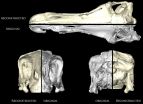Gene 'switches' could predict when breast cancers will spread to the brain
2014-11-05
(Press-News.org) SCIENTISTS have found a pattern of genetic 'switches' – chemical marks that turn genes on or off - that are linked to breast cancer's spread to the brain, according to research* presented at the National Cancer Research Institute Cancer Conference in Liverpool today (Wednesday).
The researchers, based at the University of Wolverhampton, studied 24 breast cancers that had spread to the brain, along with samples from the original breast tumour, and found a handful of genes with faulty switches.
Crucially, two of the genetic switches became faulty early on in the development of breast cancer, suggesting they may be an early warning signal for tumours that will spread to the brain. The scientists are now working to develop a blood test that might be able to detect these signals at an early stage, before the disease has spread.
Up to 30 per cent of breast cancers will eventually spread to the brain, often many years after the first tumour was treated. Tackling secondary brain tumours with radiotherapy and surgery has limited success, with most women surviving just seven months after the brain metastasis has been diagnosed.
By comparing chemical switches, known as DNA methylation, between the original breast cancer and the secondary brain tumour the researchers were able to narrow down from 120 potential candidates to find a 'signature' for cancers that had spread.
Study author Dr Mark Morris, based at the University of Wolverhampton, said: "Each year the number of women whose breast cancer spreads to the brain is increasing. While we know many of the genetic changes behind breast cancer, we know very little about why the disease can spread to the brain.
"By identifying the genes that are switched off or on in breast cancers before they spread to the brain we hope to be able to develop a blood test to spot this change. There's also potential for our findings to be used as a starting point to develop treatments that might prevent the spread."
Each year almost 50,000 women are diagnosed with breast cancer in the UK and around 11,600 die from the disease.
Dr Abeer Shaaban, member of the NCRI Breast Clinical Studies Group, said: "Tackling the problem of brain metastases is one of the greatest challenges facing breast cancer researchers. This is an intriguing new angle to explore which underlines the importance of understanding how genes are controlled as cancer grows and spreads. We're understanding more and more about cancer's biology and this is opening exciting new avenues of research that could lead to new tests and treatments."
INFORMATION:
ELSE PRESS RELEASES FROM THIS DATE:
2014-11-05
Everyone knows the scene: a basketball player at the free throw line, bouncing the ball as he concentrates on the basket. It's a tight game, and his team needs this point. He regularly makes baskets from much farther away while avoiding defenders, but now, when all is calm, he chokes and misses the basket, and his team loses. Recent research from The Johns Hopkins University suggests that in situations like this, performance depends on two factors: the framing of the incentive in terms of a loss or a gain, and a person's aversion to loss.
"We can measure someone's loss ...
2014-11-04
For years, scientists have debated how best to assess brain levels of oxytocin, a hormone implicated in social behaviors. Now, researchers at the Stanford University School of Medicine have found the first direct evidence in children that blood oxytocin measurements are tightly linked to levels of oxytocin in cerebrospinal fluid, which bathes the brain.
Low oxytocin levels in blood and CSF are both correlated to high anxiety levels, the research also showed. The findings will be published online Nov. 4 in Molecular Psychiatry.
"So many psychiatric disorders involve ...
2014-11-04
Fossils are usually deformed or incompletely preserved when they are found, after sometimes millions of years of fossilization processes. Consequently, fossils have to be studied very carefully to avoid damage, and are sometimes they are difficult to access, as they might be located in remote museum collections. An international team of scientists, led by Dr. Stephan Lautenschlager from the University of Bristol now solved some of these problems by using modern computer technology, as described in a recent issue of the Journal of Vertebrate Paleontology.
The team consisting ...
2014-11-04
In a study that included nearly 38,000 patients, those diagnosed with nonobstructive coronary artery disease (CAD) had a significantly increased risk of heart attack or death one year after diagnosis, according to a study in the November 5 issue of JAMA.
Nonobstructive coronary artery disease (CAD) is atherosclerotic plaque that would not be expected to obstruct blood flow or result in anginal symptoms (such as chest pain). Although such lesions are relatively common, occurring in 10 percent to 25 percent of patients undergoing coronary angiography, their presence has ...
2014-11-04
Among patients with metastatic melanoma, treatment with a combination of the drugs sargramostim plus ipilimumab, compared with ipilimumab alone, resulted in longer overall survival and lower toxicity, but no difference in progression-free survival, according to a study in the November 5 issue of JAMA.
F. Stephen Hodi, M.D., of the Dana-Farber Cancer Institute, Boston, and colleagues conducted a phase 2 clinical trial in which 245 patients with unresectable (unable to be removed by surgery) stage Ill or IV melanoma were randomly assigned to receive ipilimumab (intravenously) ...
2014-11-04
Testing of study participants who wore head-mounted display systems (Google glasses) found that the glasses created a partial peripheral vision obstruction, according to a study in the November 5 issue of JAMA.
Interest in wearable head-mounted display systems for general consumers is increasing, with multiple models in production. However, their effect on vision is largely unknown. Peripheral visual field is a main component of vision and essential for daily activities such as driving, pedestrian safety, and sports. Conventional spectacle frames can reduce visual field, ...
2014-11-04
BOSTON – Patients with metastatic melanoma who were treated with ipilimumab, an immune checkpoint blocker, survived 50 percent longer – a median 17.5 months vs. 12.7 months – if they simultaneously received an immune stimulant, according to a study led by Dana-Farber Cancer Institute scientists.
Patients in the clinical trial who got the combined therapies also had fewer serious adverse side effects than those who received only ipilimumab, the researchers report in the Journal of the American Medical Association.
The group treated with both ipilimumab ...
2014-11-04
San Diego — A recently developed Adeno-Associated Virus (AAV)-based medication has the potential to offer substantial protective effects for patients attempting to cease methamphetamine use. This research is being presented at the 2014 American Association of Pharmaceutical Scientists (AAPS) Annual Meeting and Exposition, the world's largest pharmaceutical sciences meeting, in San Diego, Nov. 2-6.
Methamphetamine, commonly referred to as meth, is an addictive substance that can cause brain damage, organ failure, stroke, open sores, rotting teeth, mania, paranoia, ...
2014-11-04
San Diego — Scientists have developed a novel topical microbicide loaded with hyaluronic acid (HA) nanofibers that could potentially prevent transmission of the human immunodeficiency virus (HIV) through the vaginal mucosa. This research is being presented at the 2014 American Association of Pharmaceutical Scientists (AAPS) Annual Meeting and Exposition, the world's largest pharmaceutical sciences meeting, in San Diego, Nov. 2-6.
HIV is an infectious virus that attacks T lymphocytes, a type of white blood cell that prevents infections and disease. Over time, HIV ...
2014-11-04
PHILADELPHIA – An important addition to the "eat less, move more" strategy for weight loss lies in behavioral counseling to achieve these goals. But research on how primary care practitioners can best provide behavioral weight loss counseling to obese patients in their practices — as encouraged by the Centers for Medicare and Medicaid Services (CMS) — remains slim, according to a systematic review of this topic published today in JAMA. The study was led by researchers from the Perelman School of Medicine at the University of Pennsylvania.
"After an ...
LAST 30 PRESS RELEASES:
[Press-News.org] Gene 'switches' could predict when breast cancers will spread to the brain


